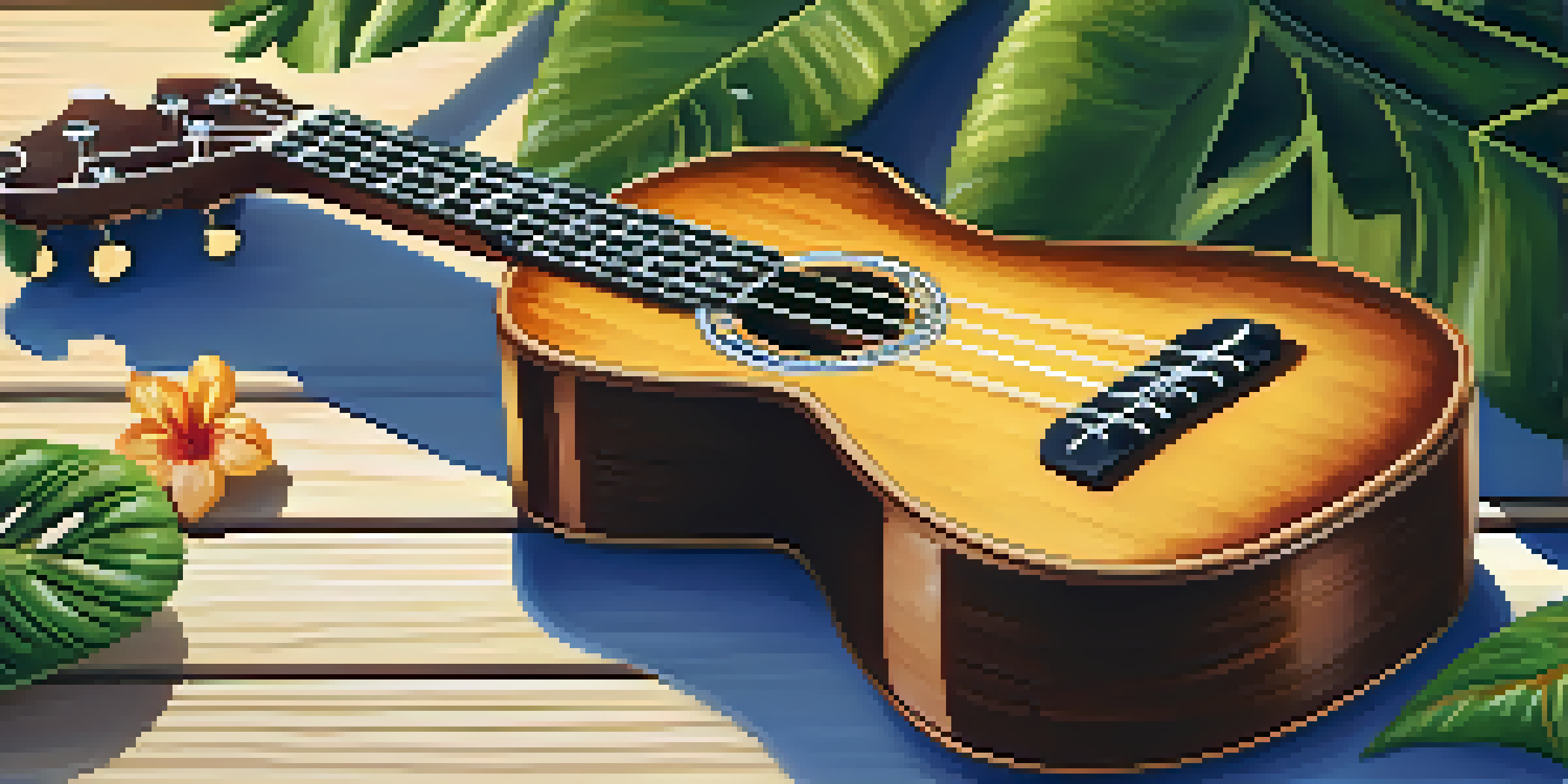The Ukulele's Journey from Portugal to Hawaii

The Ukulele's Portuguese Origins: A Brief Overview
The ukulele's roots trace back to Portugal, where it evolved from a small stringed instrument called the 'braguinha.' This charming instrument, with its bright sound, was a favorite among Portuguese musicians. The braguinha had a unique design, featuring four nylon strings and a simple body, making it easy to play and carry around. As Portuguese immigrants began to settle in Hawaii in the late 19th century, they brought this delightful instrument with them, unwittingly setting the stage for its transformation.
Music can change the world because it can change people.
Once in Hawaii, the braguinha caught the attention of local musicians, who quickly embraced its cheerful sound. It wasn't long before the instrument underwent modifications, adapting to the musical tastes and styles of the Hawaiian islands. The name 'ukulele,' which translates to 'jumping flea' in Hawaiian, was coined, possibly inspired by the way the player's fingers danced across the strings. This name change signified the ukulele's new identity, distinct from its Portuguese predecessor.
The arrival of the ukulele coincided with a period of cultural exchange in Hawaii, blending various musical traditions. As it gained popularity, local artisans began crafting ukuleles with unique designs, incorporating native woods and intricate carvings. This evolution not only enhanced the instrument's aesthetic appeal but also solidified its place in Hawaiian music, paving the way for its future as a beloved symbol of the islands.
The Ukulele's Adaptation in Hawaiian Culture
The ukulele quickly became a staple of Hawaiian music, resonating with both locals and tourists alike. It found its way into traditional Hawaiian songs, often accompanied by hula dancing, creating a vibrant cultural experience. The instrument's cheerful and lighthearted sound perfectly complemented the warm, sunny atmosphere of the islands. As a result, it became synonymous with Hawaiian identity, often seen as a representation of the islands' spirit.

Hawaiian musicians began to experiment with the ukulele, incorporating it into various genres, from folk to contemporary pop. This versatility allowed the ukulele to thrive in different musical contexts, attracting a broader audience. In the early 20th century, the instrument gained national attention, thanks in part to performances by Hawaiian ensembles at world fairs and exhibitions. This exposure helped elevate the ukulele's status beyond the islands, making it a sought-after instrument worldwide.
Ukulele's Rich Cultural History
The ukulele originated from the Portuguese braguinha and evolved in Hawaii, becoming a symbol of cultural exchange and local identity.
The ukulele's charm and accessibility contributed to its popularity, as it is relatively easy to learn compared to other string instruments. This welcoming nature encouraged many people to pick it up, fostering a community of players and enthusiasts. Today, ukulele clubs and festivals celebrate the instrument, further cementing its place in both Hawaiian and global music scenes. The ukulele's journey from Portugal to Hawaii is not just about an instrument; it's about the connections forged through music.
The Rise of the Ukulele: A Global Phenomenon
As the 20th century progressed, the ukulele began to spread beyond Hawaii, captivating audiences around the globe. Its cheerful sound and compact size made it a favorite among amateur musicians, especially during the folk music revival of the 1960s. Artists like George Harrison of The Beatles and later, Israel Kamakawiwo'ole, showcased the ukulele in their music, introducing it to new generations. This exposure helped solidify the ukulele as a beloved instrument in popular culture.
The ukulele is a cheerful instrument. It seems to bring out the best in people.
The ukulele's appeal lies in its versatility; it can be used in a variety of music styles, from jazz to rock. This adaptability has allowed it to remain relevant in a constantly changing musical landscape. Additionally, the instrument is often associated with joy and positivity, making it a popular choice for gatherings, parties, and social events. People of all ages find joy in strumming and singing along, reinforcing the ukulele's role as a bridge between cultures and generations.
With the rise of online platforms, learning the ukulele has become more accessible than ever. Countless tutorials and instructional videos are available, inviting newcomers to join in the fun. This influx of interest has led to an increase in ukulele sales, as more people seek to experience the joy of playing. As a result, the ukulele has not only maintained its relevance but has also become a symbol of community and connection across the world.
The Ukulele in Modern Music: A Versatile Instrument
Today, the ukulele is embraced by a diverse range of artists, transcending genres and styles. From indie folk to pop and even rock, its sound can be heard in various contemporary music. Artists like Jason Mraz and Ed Sheeran have incorporated the ukulele into their songs, showcasing its versatility and charm. This trend has inspired many budding musicians to pick up the instrument, eager to explore its unique sound.
Moreover, the ukulele's role in music education has gained recognition. Many schools and music programs have introduced the ukulele as a beginner instrument due to its simplicity and affordability. Students often find success and enjoyment in playing the ukulele, which can boost their confidence and encourage further musical exploration. This educational aspect reinforces the idea that music is for everyone, regardless of age or skill level.
Global Popularity and Versatility
The ukulele's cheerful sound and ease of play have led to its widespread appeal across various music genres and cultures worldwide.
The resurgence of interest in the ukulele extends beyond personal enjoyment; it has also sparked a cultural renaissance. Ukulele festivals and competitions celebrate the instrument, bringing together enthusiasts from all walks of life. These events foster a sense of community and camaraderie, as players share their passion and creativity. The ukulele continues to evolve, proving that its journey from Portugal to Hawaii has resulted in a lasting legacy that resonates around the world.
Cultural Significance: The Ukulele as a Symbol
The ukulele holds a special place in Hawaiian culture, representing more than just a musical instrument. It serves as a symbol of unity and joy, often bringing people together through music and dance. In Hawaiian celebrations, the ukulele plays a pivotal role, creating an atmosphere of happiness and togetherness. Its presence in cultural events highlights the importance of music in fostering connections among individuals and communities.
Moreover, the ukulele has become a symbol of Hawaiian identity, showcasing the islands' rich cultural heritage. Many local musicians take pride in playing traditional Hawaiian songs, preserving the unique sounds and stories of their ancestors. This cultural significance has led to efforts to promote and protect the ukulele's legacy, ensuring that future generations can appreciate its historical roots.
As the ukulele continues to gain global popularity, it also serves as an ambassador for Hawaiian culture. Musicians worldwide often incorporate elements of Hawaiian music into their performances, celebrating the instrument's origins. This cross-cultural exchange not only enriches the global music landscape but also emphasizes the importance of honoring the traditions that gave birth to the ukulele. Thus, the instrument remains a powerful symbol of cultural connection and appreciation.
The Ukulele's Influence on Music and Society
The ukulele's influence extends beyond music; it has made a significant impact on society as well. Its cheerful sound and approachable nature have made it a tool for social connection, enhancing community spirit. Many people gather in parks, homes, or online to share songs, stories, and laughter, creating lasting bonds through music. This communal aspect of playing the ukulele fosters a sense of belonging and joy, making it an essential part of many social gatherings.
Additionally, the ukulele has inspired a wave of creativity among musicians and composers. Its unique sound invites experimentation, leading to innovative compositions and collaborations. Artists often blend different musical styles, resulting in fresh sounds that capture the imagination of audiences worldwide. This creative exploration showcases the ukulele's ability to transcend cultural boundaries and bring diverse musical influences together.
Future Growth and Educational Impact
The ukulele's future looks bright, with increasing interest in music education and innovative designs catering to modern musicians.
As a result, the ukulele continues to influence contemporary music and society, reminding us of the power of connection through art. Its journey from Portugal to Hawaii is a testament to the enduring impact of music on our lives. Whether played in a small gathering or on a grand stage, the ukulele remains a beloved instrument that brings joy and unity to people everywhere.
The Future of the Ukulele: A Bright Horizon
Looking ahead, the future of the ukulele appears promising, with its popularity showing no signs of waning. As more people discover the joy of playing, the ukulele community continues to grow. This influx of interest has led to innovation in ukulele design and technology, resulting in new styles and variations that cater to modern musicians. From electric ukuleles to hybrid designs, the instrument is evolving to meet the needs of diverse players.
Furthermore, the ukulele's role in music education is likely to expand, with more schools and programs incorporating it into their curricula. As educators recognize its potential to inspire creativity and foster a love for music, the ukulele will likely become a staple in classrooms worldwide. This educational focus will help cultivate a new generation of musicians, ensuring that the ukulele's legacy endures.

Ultimately, the ukulele's journey from Portugal to Hawaii and beyond is a story of resilience, adaptability, and connection. As it continues to inspire and bring joy to people of all ages, the ukulele will undoubtedly remain a cherished instrument for years to come. With its bright future ahead, the ukulele is set to keep strumming its way into the hearts of music lovers around the globe.